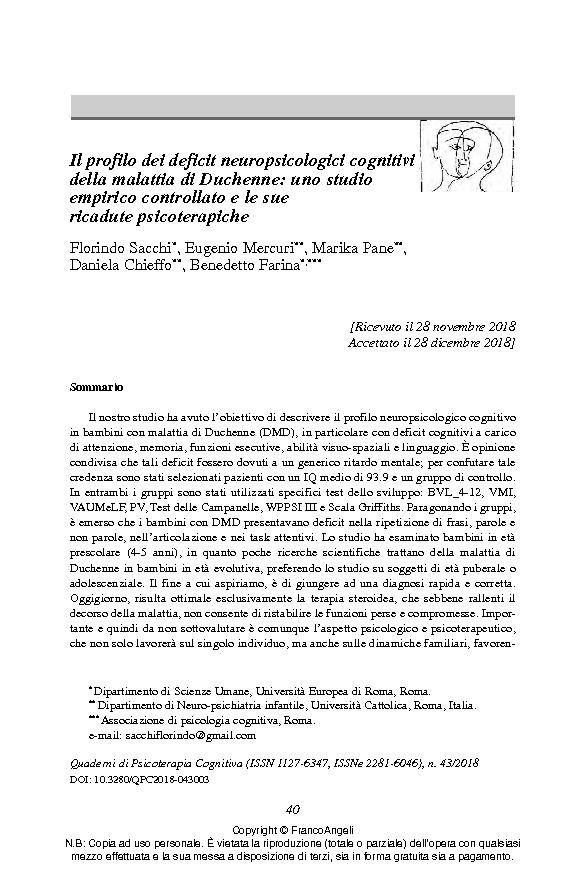Il profilo dei deficit neuropsicologici cognitivi della malattia di Duchenne : uno studio empirico controllato e le sue ricadute psicoterapiche
40-55 p.
Il nostro studio ha avuto l'obiettivo di descrivere il profilo neuropsicologico cognitivo in bambini con malattia di Duchenne (DMD), in particolare con deficit cognitivi a carico di attenzione, memoria, funzioni esecutive, abilità visuo-spaziali e linguaggio. È opinione condivisa che tali deficit fossero dovuti a un generico ritardo mentale; per confutare tale credenza sono stati selezionati pazienti con un IQ medio di 93.9 e un gruppo di controllo. In entrambi i gruppi sono stati utilizzati specifici test dello sviluppo: BVL_4-12, VMI, VAUMeLF, PV, Test delle Campanelle, WPPSI III e Scala Griffiths. Paragonando i gruppi, è emerso che i bambini con DMD presentavano deficit nella ripetizione di frasi, parole e non parole, nell'articolazione e nei task attentivi. Lo studio ha esaminato bambini in età prescolare (4-5 anni), in quanto poche ricerche scientifiche trattano della malattia di Duchenne in bambini in età evolutiva, preferendo lo studio su soggetti di età puberale o adolescenziale.
Il fine a cui aspiriamo, è di giungere ad una diagnosi rapida e corretta. Oggigiorno, risulta ottimale esclusivamente la terapia steroidea, che sebbene rallenti il decorso della malattia, non consente di ristabilire le funzioni perse e compromesse. Importante e quindi da non sottovalutare è comunque l'aspetto psicologico e psicoterapeutico, che non solo lavorerà sul singolo individuo, ma anche sulle dinamiche familiari, favorendo in tal modo l'accettazione, il più possibilmente serena della malattia e delle sue conseguenze, coadiuvando così con il trattamento sanitario. [Testo dell'editore].
Our study aimed to describe the cognitive neuropsychological profile in children with Duchenne Muscular Dystrophy (DMD), particularly those with cognitive deficits in charge of attention, memory, executive functions, visuospatial abilities, and language. It's shared opinion that these deficiencies were due to generic mental retardation; to refute this belief, patients with an average IQ of 93.9 and a control group were selected. In both groups, specific development tests were used: BVL_4-12, VMI, VAUMeLF, PV, the Bells Test, WPPSI III, and the Griffiths Scales. Comparing the groups, it was found that children with DMD had deficits in the repetition of sentences, words and not words, in articulation and attentional tasks. The study examined preschool children (4-5 years), as few scientific studies deal with Duchenne Muscular Dystrophy in children in developmental age, preferring the study of pubertal or adolescent subjects. The goal to which we aspire is to arrive at a quick and correct diagnosis.
Nowadays, only steroid therapy is optimal, and although it slows down the course of the illness, it does not allow to restore the lost and compromised functions. The psychological and psychotherapeutic aspect is important and therefore not to be underestimated, it will work not only on the individual, but also on family dynamics, thus favoring the serene acceptance of the illness and its consequences, and therefore assisting with health treatment. [Publisher's text].
-
Articles from the same issue (available individually)
-
Information
ISSN: 2281-6046
DISCIPLINES
KEYWORDS
- Distrofia muscolare di Duchenne, età prescolare, deficit cognitivi, trattamento combinato, diagnosi precoce



